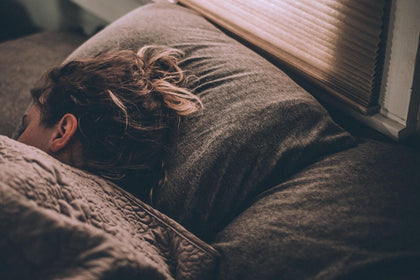It's no secret that healthy sleep habits are the foundation of any holistic health and beauty routine. Sleep helps regulate your nervous system by giving it a chance to relax and is strongly linked to a number of beauty outcomes.
For example, while you're enjoying a good night's sleep, the deeper layers of your skin go into a repairing mode, while the protein synthesis necessary for the growth of stronger, healthier hair also takes place. But not just any type of sleep will do. Instead, quality sleep is the key to a more beautiful, healthier you.
Here are the most important steps you can take to combat poor sleep hygiene and improve your beauty sleep — plus, find out what products you can use to encourage better sleep and better hair.
1. Establish a Pre-Bedtime Routine
The first step to good sleep hygiene is to make sure you're setting yourself up for success with your bedtime routine. Keeping a consistent bedtime routine helps your body understand that you're beginning to unwind for the day and may help you fall asleep with less delay.
Your nightly routine should begin between 30 minutes to one hour before you go to bed and can include any of the following activities:
- Taking a warm bath or relaxing shower
- Enjoying a guided meditation to relax your mind
- Listening to quiet, soothing music
- Swapping out your phone for a good book
- Doing some gentle, non-aerobic stretches to soothe muscles
2. Create a Sleep-Friendly Environment
Creating an environment that supports healthy sleep habits can lead to improved sleep and help establish positive bedtime habits. Experts say that the environment someone sleeps in can have a significant impact on their ability to fall asleep.
An ideal sleep environment should be dark and comfortable, with few if any electronic devices. A comfortable mattress, pillow and blankets you like makes it easier to fall asleep. An eye mask or curtains can help protect you from sleep-preventing bright light.
3. Stick to a Consistent Sleep Schedule
If you find you have trouble falling asleep or are suffering from consistently poor sleep quality, an out-of-sync sleep schedule may be to blame. "Keep a consistent sleep schedule all week and get out of bed as soon as you wake up," said team wellness expert and clinical psychologist Ryan C. Warner. "Laying around in bed makes it harder for you to keep to a good sleep schedule."
Studies show that people who have an irregular bedtime sleep less overall and may have their circadian rhythm disrupted. If you tend to have trouble falling asleep, try to go to bed and wake up at roughly the same time every day. Avoid naps, and go to bed only close to bedtime when you feel tired.
Shop: GRO+ Advanced AGELESS Essentials Kit
4. Be Cautious About Coffee & Alcohol
If you're concerned you have a sleep disorder, the first thing a professional will ask you about is your alcohol consumption and use of caffeinated drinks.
While both of these things can be enjoyed in moderation, too much alcohol can interrupt sleep patterns and even cause insomnia. Similarly, drinking caffeine can interfere with your ability to sleep. To be safe, avoid drinking caffeine in the six hours before you go to bed, and remember that both alcohol and caffeine are best enjoyed in moderation.
Related: Does Caffeine Affect Hair Growth and Loss?
5. Make Your Bed a Sleep-Only Zone
When you regularly use your bed for activities other than sleeping and sex, such as lounging while reading or looking at your phone, your body learns to uncouple the link between lying in bed and falling asleep.
Warner said you could combat this association by avoiding the temptation to use your bed as a general space for non-sleep relaxation. "Don’t go to bed until you are sleepy," he said. Improve your sleep by creating an alternative space for non-sleep-related relaxation activities, like a comfortable couch or a daybed in another room you can use as your chill zone.
6. Keep Your Cool
Whatever your daytime temperature preferences, experts agree that temperature has a major impact on how well your body is able to rest. Your body temperature drops as your sleep, cooling throughout the night. Bedroom temperature can help support this natural process.
When the room you sleep in is too warm, your body struggles to complete this essential aspect of getting a good night's sleep. Keep your room at a comfortable temperature, which, for most, is between 60-67 degrees, to ensure you're getting restful sleep.
Shop: Eye Mask
7. Get Regular Exercise
Getting exercise each day is an essential healthy habit that can actually help you when it comes time to get some Z's. According to studies, exercise can stimulate a number of systems necessary for healthier sleep, promoting both sleep quality and duration.
8. Cut Down on Screen Time
If you're having trouble sleeping, Warner suggests you minimize your screen time in the bedroom and before bed. The best way to do this is to keep your bedroom screen-free to minimize opportunities for giving into temptation. "When you get into bed before you’re tired, you’ll probably start watching TV or scrolling down social media, which will keep you awake. It is also best not to take any electronic devices or screens to bed," he said.
This is because the blue light emitted by your phone screen and other tech, like tablets and laptops, has been shown to reduce the levels of melatonin, the chemical your body uses to regulate the sleep/wake cycle in your body. Read a book before bed instead of doom scrolling, and whenever possible, try to keep your room free of electronic devices.
9. Manage Your Stress
It should come as no surprise that stress can make it hard to fall asleep. When you're thinking about things that stress you out, your body is flooded with the stress hormone cortisol, which puts your systems in a state of alertness. But the less sleep you get, the more likely you are to experience stress!
The solution starts before you get into bed. "You must not work or do anything that causes you to stress in bed or just before going to sleep," said Warner. Adding relaxation exercises to your bedtime routine, or taking time to meditate and practice gratitude throughout the day, can help ease stress and make healthy sleep easier.
#include-related-slider#
Make Sleep Hygiene Work for You
Although everyone does it, falling asleep is personal — and ultimately, it's all about finding the sleep hygiene solutions that work for you.
Test out habits like sticking to a bedtime routine, establishing a schedule and creating a sleep-friendly environment to encourage your body to wind down. And if none of this works, follow up with your doctor, who can help you assess your individual sleep needs.
More From VEGAMOUR
- Losing Sleep and Hair: Could They Be Connected?
- Can Melatonin Help With Hair Growth?
- Get to Know VEGAMOUR's Supplements
Photo credit: Lux Graves/Unsplash
Back


















